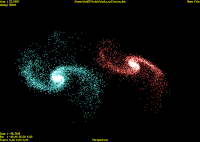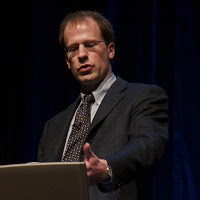All Things
- The Mystery Of Too Many Variables
Standard theory of particle physicsWe have now two great physical theories: · On one side, quantum mechanics, which applies primarily to very small objects (those scarcely affected by gravity), and is...
- The Final Anthropic Principle And The Antichrist
Pierre Teilhard de ChardinIn their popular science book, The Anthropic Cosmological Principle, published in 1986, cosmologists John Barrow and Frank Tipler define three different anthropic principles:1. The weak anthropic...
- Artificial Life Is Not Here
Saccharomyces cerevisiae (yeast)Last spring, the media published the news that a scientific team had replaced the smallest chromosome of a yeast cell by a synthetic chromosome, built from the nucleic acid sequence of the replaced chromosome with a few...
- The Probability Of Existence Of Extra-terrestrial Intelligence
Normal statistical distribution. The text makes reference to a uniform statistical distribution.Probability is a well-known mathematical concept that was initially defined to quantify random data in mathematically known environments and has been extended...
- The Dawkins Delusion
Richard DawkinsThis is my analysis of Richard Dawkins book, The God Delusion (2006). I'll start by signaling a couple of inconsistencies. There are many more, but detailing all would require a book size.· In...
All Things
We are not living in a simulation: a note on Nick Bostrom?s proposal
 |
| Simulation of the collision of two galaxies |
In a paper published in 2003 [1] Nick Bostrom proposed the following reasoning:
A technologically mature ?posthuman? civilization would have enormous computing power. Based on this empirical fact, the simulation argument shows that at least one of the following propositions is true:
(1) The fraction of human-level civilizations that reach a posthuman stage is very close to zero;
(2) The fraction of posthuman civilizations that are interested in running ancestor-simulations is very close to zero;
(3) The fraction of all people with our kind of experiences that are living in a simulation is very close to one.
· If (1) is true, then we will almost certainly go extinct before reaching posthumanity.
· If (2) is true, then there must be a strong convergence among the courses of advanced civilizations so that virtually none contains any relatively wealthy individuals who desire to run ancestor-simulations and are free to do so.
· If (3) is true, then we almost certainly live in a simulation.
In the dark forest of our current ignorance, it seems sensible to apportion one?s credence roughly evenly between (1), (2), and (3).
This reasoning embodies one important problem. There is a fourth possibility, which Bostrom has not considered:
(4) We may be one of the first intelligent civilizations in the universe, so nobody has had an opportunity to generate simulations yet.
 |
| Nick Bostrom |
On the other hand, the figures offered by Bostrom in section III of his paper are not convincing and contain errors (the result of the computation performed in note [10] is one order of magnitude larger than stated). It is obvious that, to simulate an universe as complex as ours, the amount of information needed would be at least the same as our universe contains, which means that the computer where that simulation were run should be larger than the universe it is simulating. In short, if we live in a simulation, the universe where this simulation was implemented must have been much larger and complex than ours and therefore much less probable. Bostrom?s inference (that the number of simulations must be very large) is therefore untenable. Finally, if our universe were actually infinite, as some cosmologists assert, it would be simply impossible to simulate.
In conclusion, it is not sensible to apportion one?s credence between options (1), (2) and (3), as Bostrom asserts. Option (4), which we deem the most probable, must also be considered, while option (3) would be the least probable, in our opinion vanishingly so.Reference
[1] Bostrom, N. (2003): Are you living in a computer simulation?Published in Philosophical Quarterly Vol. 53, No. 211, pp. 243-255.
The same post in Spanish
Manuel Alfonseca
Elena Postigo
- The Mystery Of Too Many Variables
Standard theory of particle physicsWe have now two great physical theories: · On one side, quantum mechanics, which applies primarily to very small objects (those scarcely affected by gravity), and is...
- The Final Anthropic Principle And The Antichrist
Pierre Teilhard de ChardinIn their popular science book, The Anthropic Cosmological Principle, published in 1986, cosmologists John Barrow and Frank Tipler define three different anthropic principles:1. The weak anthropic...
- Artificial Life Is Not Here
Saccharomyces cerevisiae (yeast)Last spring, the media published the news that a scientific team had replaced the smallest chromosome of a yeast cell by a synthetic chromosome, built from the nucleic acid sequence of the replaced chromosome with a few...
- The Probability Of Existence Of Extra-terrestrial Intelligence
Normal statistical distribution. The text makes reference to a uniform statistical distribution.Probability is a well-known mathematical concept that was initially defined to quantify random data in mathematically known environments and has been extended...
- The Dawkins Delusion
Richard DawkinsThis is my analysis of Richard Dawkins book, The God Delusion (2006). I'll start by signaling a couple of inconsistencies. There are many more, but detailing all would require a book size.· In...
